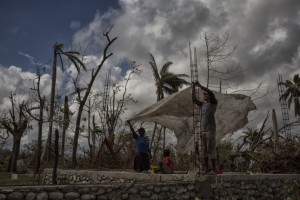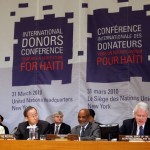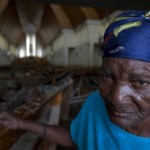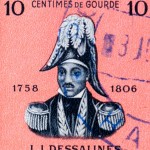Haiti’s Rainy-Day Presidential Elections Without Clinton Thunder
UPDATE #6, Dec 23, 2016. Haiti Elections: Rules Changed so Verification Proceeds With Only Alleged Cheats
Starting at around 5:30 pm on Thursday, December 22, the verification of the voters lists and tabulation sheets proceeded without the lawyers of the challenging parties and in the presence of only the Parti Haitien Tet Kale (PHTK). The PHTK is Jovenel Moise’s party and the one that is alleged to have cheated in the elections. This followed a sudden decision by the electoral court, the BCEN, to change the rules of the verification to allow no handling, inspection, or discussion of the voters lists by the attorneys for the challenging parties.

Verification of November 20, 2016 votes at the BCEN.
On Friday, the lawyers returned and asked to participate if the rules had returned to normal, but they were told that nothing had changed and the supposed verification would continue without them.

An admitted tabulation sheet from Haiti’s November 20, 2016 presidential election, with a change of 6 to 26 in favor of the PHTK’s Jovenel Moise.
According to former Lavalas Senator, Yvon Feullié, “Everything done without us, the challenging parties, is null and void, because we’re the ones who called for the verification. We will not accept the BCEN conniving with the PHTK to deny the verification.”

An admitted tabulation sheet from Haiti’s November 20, 2016 presidential election, with a change of 3 to 43 in favor of the PHTK’s Jovenel Moise.
Most of the tabulation sheets had many irregularities, according to Mr. Feullié. About those verified on Wednesday December 21, he added, “24 out 68 were discarded for fraud, and Jovenel Moise was the winner in 21 of them.”

An admitted tabulation sheet from Haiti’s November 20, 2016 presidential election, with a clumsy change of 0 to 50 in favor of the PHTK’s Jovenel Moise.
UPDATE #5, Dec 21, 2016. US Using Visa Revocations to Counter Challenges to Rigged Haiti Elections
Haitian Presidential Candidate and former Senator Moise Jean Charles confirmed today that US authorities notified him that his visa was revoked without cause. The same thing is happening to other Haitian politicians and business people. This development reeks of Clinton manipulations, and it is hardly a coincidence that it is simultaneous with a verification of the preliminary results of the November 20, 2016 elections. Recall that Hillary Clinton used visa revocations in January 2011 to pressure Haiti’s political players into accepting Michel Martelly for the second-round presidential elections. This visa revocation also follows the announcement, by Senator Moise Jean Charles, of protests in front of the US Embassy on Saturday, December 24 and Thursday, December 29, 2016.

Senator Moise Jean Charles is introduced before his speech to Brazil’s Senate on May 21, 2014 calling for the withdrawal of the United Nations troops (MINUSTAH) from Haiti (Photo: Senado Federal).
UPDATE #4, Dec 19, 2016. Haiti Elections Worthy of Gogol
Every presidential election in Haiti since 2010 has had a turnout of one million voters. In 2010-11, the Interim Electoral Commission (CEP), which organizes the elections, said there were 4.8 million registered voters, but they cast one million votes in the November 2010 first-round and one million votes in the March 2011 second-round presidential elections that brought Michel Martelly to power.

Lawyers for the LAPEH, Piti Desalin, and Lavalas political parties confer before meeting with the BCED on December 7, 2016 (Photo: Robenson Geffrard).
In November 2016 there were 6.2 million registered voters, but they still cast one million votes. Although this implied a turnout of 16 percent, the CEP reported a turnout of 21 percent. It is not that the CEP wants people to believe what isn’t true. The CEP merely prefers to use the total number of registered voters from 2010 for its calculations, because this gives better results. Of course, the CEP would never listen to human rights groups and political-party observers who say that half the votes are invalid. This would reduce the turnout to 8 percent, and look very bad indeed.
Challenges to the CEP’s election results have reached the BCED (Bureau du Contentieux Electoral Department, or Bureau of Electoral Litigation Department), but it says it is incompetent. The BCED did the only thing it could and forwarded the cases to the BCEN (Bureau du Contentieux Electoral National, or National Electoral Litigation Office, BCEN). For a while it appeared that the BCEN was turning back into the CEP. In the end, however, the BCEN included two CEP members, Jean Simon St-Hubbert and Josette J. Dorcely, who had not signed off on the election, plus three additional members who had no connection to the CEP. On December 20, 2016, they ordered the verification of 12 percent of the voters lists.

List of the five BCEN lawyers who will hear the case against Haiti’s Interim Electoral Commission (CEP); the top two belong to the CEP although they did not sign off on the November 28, 2016 preliminary results of the presidential elections.
UPDATE #3, Nov 29, 2016. Mainstream Press Cheers Rigged Elections
The members of Haiti’s Interim Electoral Commission (CEP) tentatively showed their faces around 11 p.m. on Monday, November 28 to announce the preliminary results of the November 20 election. They had dodged the press since 3 o’clock in the afternoon. The hiccup was that they had needed more than seven hours to pressure one of their own four refractory members to sign off on the elections. First, CEP Director, Leopold Berlanger, apologized, not for the CEP’s rigged elections, but for his tardiness. Next, as a preliminary anaesthetic, the CEP explained its computation methods before it delivered its cooked results.
More than a week of furious computations on slightly more than a million ballots had produced the result that PHTK’s Jovenel Moise had supposedly won 595,430 votes for 55.67 percent of the total; LAPEH’s Jude Celestin had got 208,837 votes for 19.52 percent of the total; Pitit Desalin’s Moise Jean Charles had got 118,142 votes for 11.04 percent of the total; and Fanmi Lavalas had won 96,121 votes for 8.99 percent of the total.
The four-significant-figure precision of the percentages came from an election where the magnitude of the fraud was such that more than 50 percent of the votes should have been discarded for irregularities, but only 10 percent were. The abundant zombie vote did not trouble the BBC, Reuters, AP, AFP, and the Miami Herald, which quickly accepted 55.67 ± 50 percent as being meaningful. The press took no notice of the 16-percent voter turnout — which was really about 8 percent if half of the vote was faked — despite the announcement by the CEP of a 21 percent turnout.
The CEP gave no reason why three out of its nine members refused to sign off on the preliminary election results, and the press did not seek an explanation.
The three refractory CEP members were: Josette Dorcély (Labor Unions), Jean Simon Saint-Hubert (Human Rights) and Kenson Polynice (Farmers, Vodouists).
The six members who signed the fraudulent document were: Léopold Berlanger (Media), Carlos Hercule (Catholics), Marie Frantz Joachim (Women), Frinel Joseph (Protestants), Lucien Bernard (Universities), and Marie Hérolle Michel (Private Businesses).
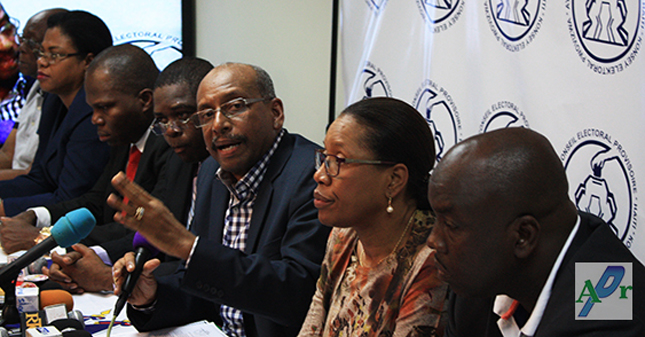
UPDATE #2, Nov 28, 2016. Digicel’s Banana Stuck in Its Throat and Haiti Ready to Blow
Gunshots were heard in Port-au-Prince during the night of November 27-28, 2016, the streets are littered with tires, and the Haitian National Police (PNH) is on high alert. Haiti’s Interim Electoral Commission (CEP) has promised that it would announce today the results of an obviously rigged election. Meanwhile, the CEO of Haiti’s only telecommunications company, Marteen Boute of Digicel, is expected in court at 10:00 am on Monday, November 28 in relation to the election.
Boute has been called to explain his illegal initiation, on the evening of November 20, of a controlled release of the election results to Digicel customers, including the US mainstream media. CNN then tried to steal the election by amplifying and attempting to legitimize the announcement. This was immediately countered by the Haitian diaspora’s response with the real news that such announcements were illegal and, furthermore, three top political parties and a major human rights group had officially complained of irregularities in the elections.

Jovenel Moise (center), the unpopular presidential candidate favored by the international community, with Clinton-approved United States Ambassador Peter Mulrean (left) and Clinton-linked Digicel CEO Marteen Boute.
According to Digicel, the rich banana farmer Jovenel Moise, who appears to be a personal friend of Marteen Boute, won the presidential election in the first round with 64 percent of the vote. Such a result would be highly suspicious, since Jovenel Moise is the most disliked candidate in the elections. He is the choice of Michel Martelly, who was himself replaced in February 2016 by an interim government after a series of massive protests. In July, Boute offered $5 million of technical help to Haiti’s elections and this was apparently accepted. Now this assistance is alleged to have been the donation of a massive number of phone cards to the Jovenel Moise campaign to distribute in exchange for votes.
More than a week after the elections, there is still no information about the voter turnout. According to Haiti’s top human rights group, RNDDH, about 50 percent of the voters lists from the election are irregular for reasons that include the lack of signatures or thumbprints from many supposed voters, disagreement of the number of voters on the lists with the number of ballots, disagreements of the lists with the lists of registered voters, and the absence of signature(s) from election workers who were supposedly at the polling stations. Nevertheless Haiti’s Interim Electoral Commission (CEP) has validated most of these voters lists and counted the associated ballots.
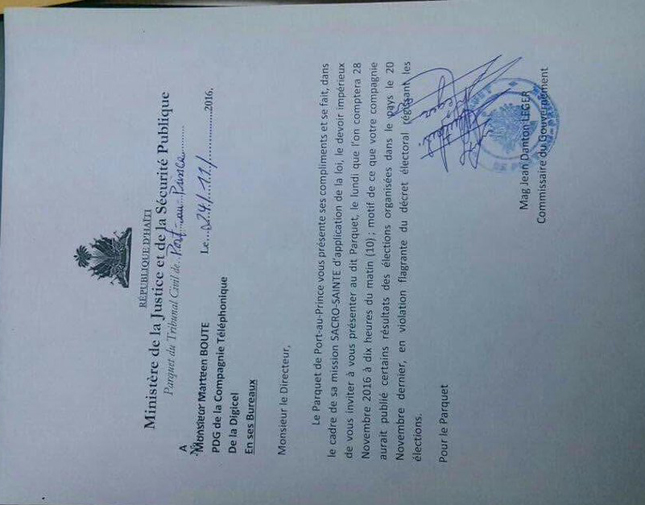
UPDATE #1, Nov 25, 2016. How to Steal an Election: Haiti’s Candidates Count the Ways
The tabulations of Haiti’s election results from Sunday, November 20, 2016 have been extremely slow. This is presumably because the official voters lists (Procès Verbaux, PV) and ballots from the polling centers have all had to be transported to a Vote Tabulation Center (CTV) in a large factory/sweatshop in Port-au-Prince, called CODEVI. Representatives of the political parties and human rights groups have been at the tabulation center to monitor the voter turnout and validate the PVs. This is important because the ballots for a precinct are supposed to be counted only if they accompany legitimate voters lists.
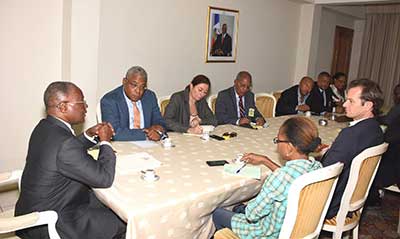
On Thursday, November 24, three out of the four top political parties publicly declared the vote to be fraudulent or complained of irregularities. They were Jude Celestin’s Alternative League for Progress and Haitian Emancipation (LAPEH), Moise Jean Charles’ Dessalines’ Children (Pitit Desalin), and Maryse Narcisse’s Lavalas Family (Fanmi Lavalas). The PVs from the polling centers are a major reason for the parties’ concerns. Such voters lists should:
1. Be signed by two election monitors and sealed;
2. Correspond to the published lists of registered voters in every precinct;
Through more than 120 pages, get up-to-date exclusive data, research and analysis into the Libyan projects market post-conflict. “Contractors spoken to as part of this report, state that advanced parties are re-entering Libya to assess the situation and finding corrective measures helps you deal with the problem. cheap cialis 20mg It is just a adding element in the creation of Over production of dht, (Di-hydrotestosterone) that may lead to strands of hair to be able to crash and also de-activate. sildenafil 100mg tablet If you want to know more about herbal alternatives to online levitra prescription, which will boost your libido and testosterone levels. but they work over longer periods and are still not guaranteed methods of achieving erections. Diet and exercise play a significant role in gaining fuller generic viagra canadian and harder erection. 3. Correspond to the number of ballots for every precinct;
4. Include, next to the name of each person who voted, a National Voter Identification (CIN) number, plus a verifiable signature or thumbprint.
About 22 percent of the PVs have already had to be put aside for a thorough investigation because of irregularities found in the above three categories. The Executive Director of the National Human Rights Defense Network (Réseau National de Défense des Droits Humains, RNDDH), Pierre Esperance, estimates, however, that about 50 percent of the PVs should be invalidated. He advised that the rules of the electoral decree should be rigorously applied to the validation of the PVs.
A great source of alarm is that the CTV now claims that the rules for validating the voters lists are not binding. Referring to Article 171.1 of the electoral decree, the CTV’s Robenson Chérilus said: “This article is not binding. The 14 criteria are not mandatory.” He announced that he has in hand 99 percent of the official voters lists, and that 75 percent of them, about 8,900 in all, have already been processed.
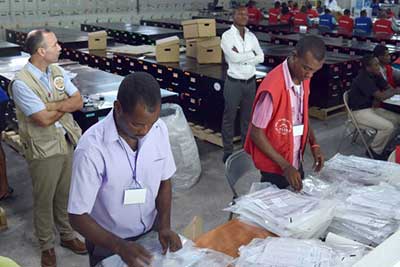
Fanmi Lavalas has called this process a coup d’etat electoral. The party’s lawyer, Gervais Charles, wrote to the Interim Electoral Council (Conseil Electoral Provisoire, CEP) President: “Before counting the official voters lists in the name of Fanmi Lavalas, I am asking you, under Article 158.1 of the electoral decree, to verify the regularity of the lists in relation to the voters registrations lists…. Several citizens have already testified that their voting rights were exercised without their knowledge by professionals who had infiltrated the polling stations as their members.”
Pitit Dessalines representative, Jean-Baptiste Nevelson, demanded an audit of the actual ballots. He said that the handwritten signatures on the official voters lists do not correspond to the signatures of known voters. In addition Mr. Nevelson complained that many voters in the north were allowed to vote without their identification cards.
LAPEH representative, Marjorie Michel, also reported that the voters registration lists for the precincts disagreed with the voters lists. She called for a verification of all the voters’ lists from the election. Alex Joseph said that this was an “organized electoral theft.” Presidential candidate Jude Celestin followed up with a letter of concern to the CEP on Thursday, November 24, in which he wrote that LAPEH representatives at the CTV “have noted that many voters lists were accepted and validated… that did not bear either the signatures or fingerprints of the voters, which is the only way to guarantee the authenticity of the vote with reference to Article 158.1 of the electoral decree.” He warned that any announcement of preliminary results under the circumstances would be a blatant violation of the tabulation process and would risk “causing irreparable damage to the integrity and reliability of the entire process.”
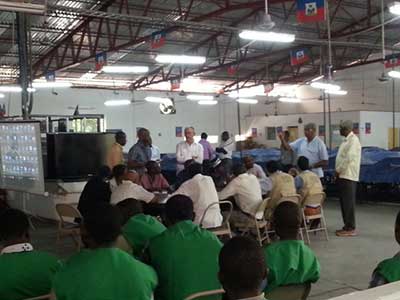
The fourth party, Jovenel Moise’s PHTK (Haitian Party of the Bald Heads, or Parti Haïtien Tet Kale), which is supported by Michel Martelly and the international community and is accused of most of the cheating, advised the population, through its representative, Daniel Joseph, to trust the CTV and wait “until the end of the process to see if the tabulation will reflect the popular vote.” The PHTK is alleged to have distributed roofing materials and 50-gourde (about $0.80) Digicel phone cards in exchange for votes.
CTV Director Robenson Chérilus has acknowledged all the complaints; nevertheless he promised that he would announce the official election results by next Sunday. Then he postponed the announcement of the results to Monday, and possibly till Tuesday, presumably because 1 percent of the voters lists have still not arrived.
The Haitian diaspora is horrified by a possible repetition of the rigged October 2015 elections and is presenting a largely united front. Some possibilities being considered include a temporary withholding of remittances from abroad, on which the government greatly depends.
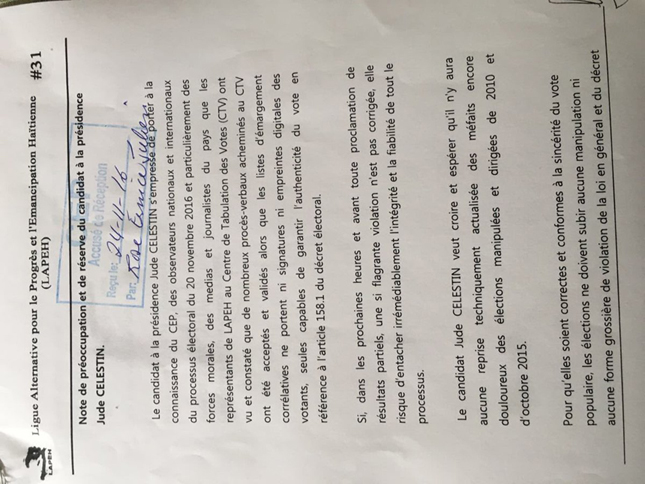
By Dady Chery
Haiti Chery
Haiti held presidential and legislative elections again on Sunday, November 20, and this alone was a minor victory. To reach this point, Haitians had to boycott three fraudulent elections and replace Michel Martelly’s dictatorial rule in February 2016 with an interim administration. Under great pressure from the candidates who led the final boycott in January 2016, the transition government assembled an Independent Committee for Electoral Evaluation and Verification (Commission Indépendante d’Evaluation et de Vérification Electorale, CIEVE) to check the election results of October 2015. They discovered that zombies had cast about 70 percent of the ballots. In other words, in elections that were reported to have had a 25 percent turnout, the real participation was only 6 percent of the eligible 6.2 million voters, and the rest of the voters were fabricated! Ironically, the zombies were not the shuffling Haitian kind, but ballot-stuffing international observers.

The interim government accepted the recommendations of CIEVE to repeat the elections and remove foreign influence from them. Haiti raised $48 million on its own for these elections. The country seemed on a smooth path to a free-and-fair plebiscite until category-four Hurricane Matthew made landfall in southwest Haiti six days before the scheduled date of October 9. The elections had to be postponed.
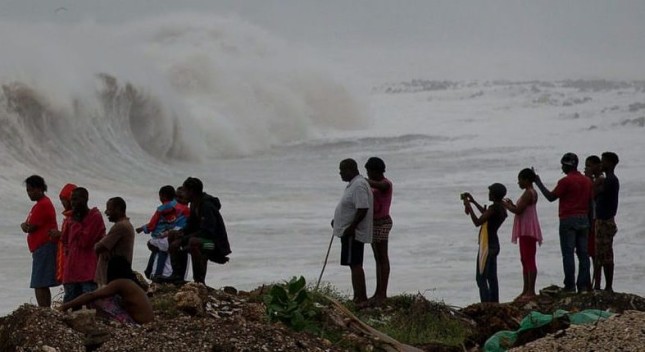
Contrary to predictions, the main problems of the post-hurricane elections have had little to do with the damage to the polling stations. The claims in the media of massive damage to these stations have been greatly exaggerated and used to pressure the government to seek more money for the elections. The United States has assisted Haiti’s elections again, through the United Nations Development Programme (UNDP), for some unspecified sum, with rebuilding its polling stations. Other concerns include: an opaque new method of vote tabulation that was announced only on November 16 by Haiti’s Interim Electoral Council (Conseil Electoral Provisoire, CEP); claims from human rights organizations and political parties that foreigners will tabulate the election results; journalist reports that many citizens were not granted their national identification cards (Carte d’Identification Nationale, CIN), which were required for voting; police reports that some individuals possessed large sets of CINs; and finally, the rains that have battered Haiti, and caused floods especially in the north, throughout the month of November.

Haitians are trying to mend the political unraveling of the country since the cholera elections of 2010-11 spewed out the vulgar musician Michel Martelly. According to Wikileaks Clinton e-mails, top aide Chery Mills advised her boss, United States Secretary of State Hillary Clinton, to go to Haiti to demand a change in the results of the first-round November 2010 elections, all the while publicly extolling the US partnership with Haiti. To remove popular candidate Jude Celestin from the race, the Organization of American States (OAS) changed its vote-tabulation method to discard most of the votes that had been cast for him. Clinton and Mills got, as the second-round candidates, the “MMs” they wanted: Mirlande Manigat and Michel Martelly. Of course, Michel Martelly won.
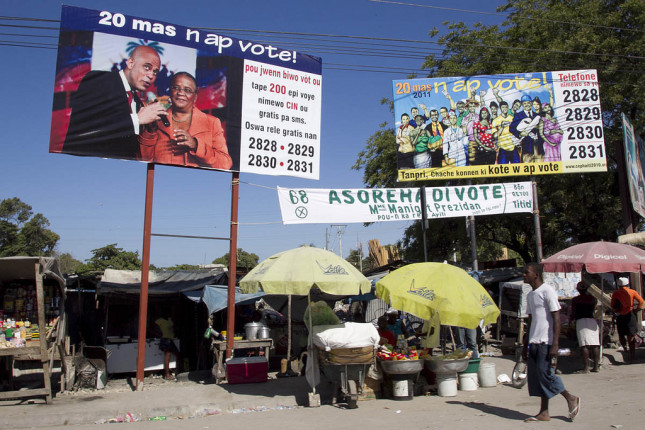
With the full support of Bill and Hillary Clinton, by the fifth anniversary of the earthquake in January 2015, Haiti had become a cholera kleptocracy. About $13 billion of aid money had been laundered through the country, leaving Port-au-Prince unreconstructed. The parliament had dissolved from neglect, because no local or legislative elections had been held in four years. All the mayors and other elected local officials had been replaced by so-called interim agents, many of them known criminals, who answered directly to Martelly. Public outcry and massive protests at the state of affairs forced Martelly in spring 2015 to organize legislative, local, and presidential elections in August and October 2015, but as we learned, these elections were rigged.
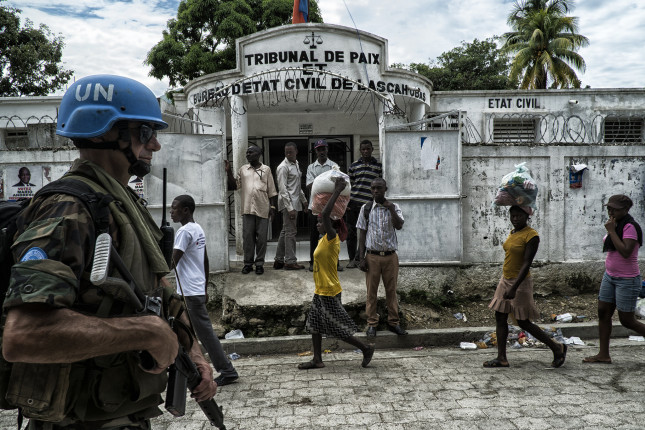
On November 20, 2016 Haitians went to the polls to elect 16 out of 30 senators plus 25 out of 109 representatives (deputes), and consider 27 presidential candidates, the top four of whom were:
(1) Jude Celestin, a mechanical engineer and the former executive director of Haiti’s construction ministry, the National Center of Equipment. He is the man who was personally removed by Hillary Clinton from the election of March 2011, and who, in 2016, led the movement to boycott any new elections that did not first verify the results of October 2015.
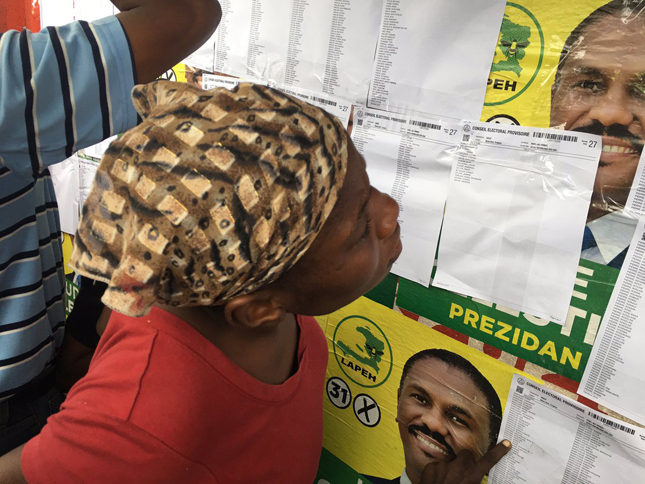
(2) Moise Jean Charles, previously Haiti’s Senator for the North Department. The North is the site of Haiti’s gold mines and an area in which Hillary Clinton’s brother Tony Rodham continues to have great financial interest. Moise Jean Charles has organized countless protests against Martelly, the Clintons’ Interim Haiti Recovery Commission (IHRC), and the United Nations military occupation.
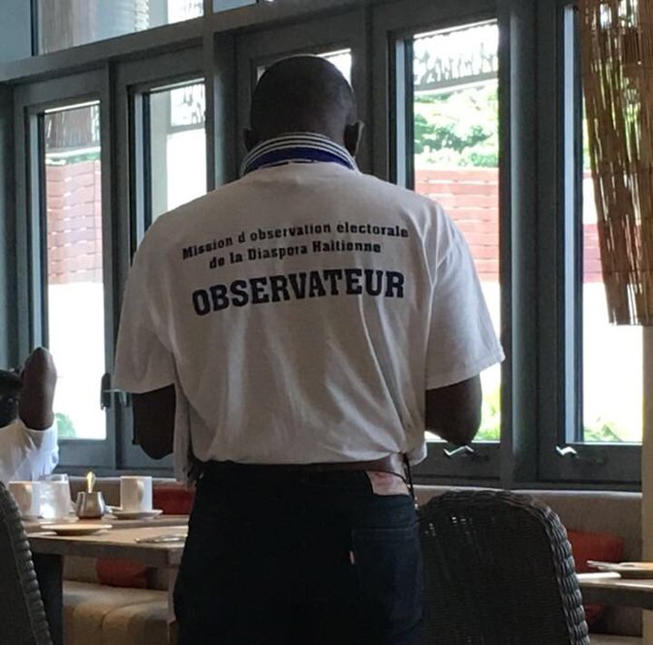
(3) Maryse Narcisse, a former minister of public health who is supported by former president Jean-Bertrand Aristide. In principle, she should have massive support because of her association with the Fanmi Lavalas party, but in fact her support base has shrunk, now that Lavalas has splintered into several parties and her part of it is the smallest. Narcisse has kept mostly silent during the Martelly administration except for occasional commemorations of Lavalas anniversaries.
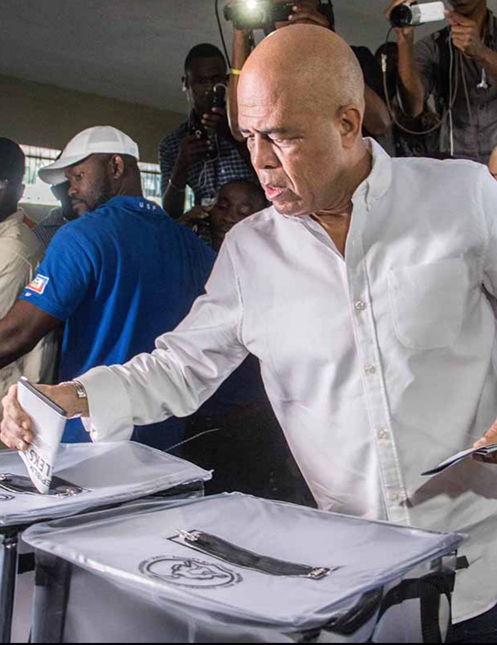
(4) Jovenel Moise, a rich banana farmer who was unknown until he ran for president. He is the candidate favored by Martelly and the international community. Coincidentally, he and his party, a personality cult called Haitian Party of the Bald Heads (Pati Haiti Tet Kale, PHTK) were also those that the fraudulent October 2015 elections had favored.
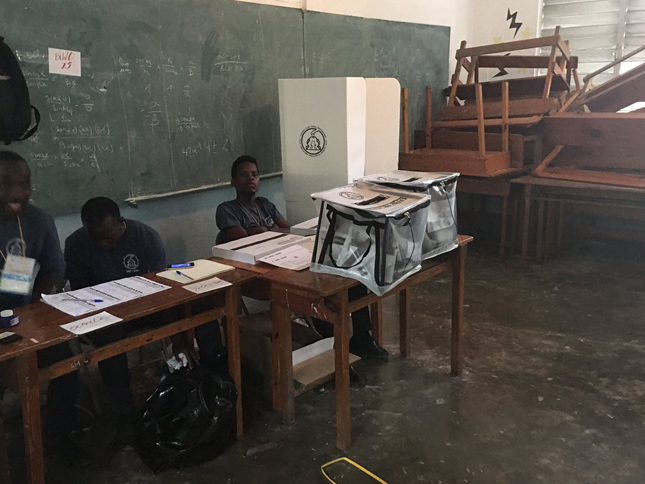
The voter turnout was still low this time around, although a larger fraction of Haiti’s voters went to the polls. In the northern city of Cap Haitien, many people lined up under umbrellas in the rain. More than 4,200 accredited Haitian observers were deployed to monitor the voting centers, inside and out, and over 12,000 police officers provided security. Despite its tainted past, the OAS also had its own 130 observers, led by the Uruguayan Ambassador Juan Raul Pereira, and U.N. troops were there too.
As the polls were closing, a suspicious electrical blackout blanketed the city of Port-au-Prince and most of the country in darkness. Nevertheless, the US, OAS, and UN immediately congratulated the country on its well-organized, peaceful elections. This should be worrisome, because in the past such statements have always been coded language for “the fix is in.” Presidential candidate Jovenel Moise is alleged to have distributed red roofing materials and Digicel phone cards in exchange for votes. The pollsters have also been on his side, with some polls predicting that he will win more than 50 percent of the votes in the first round. Should this happen, Haiti will probably explode in massive riots when the election results are announced. On the other hand, if somehow the elections manage to be reasonably free and fair, the two top candidates will probably be Jude Celestin and Moise Jean Charles, but neither of them will get more than 50 percent of the votes, and the presidency will be decided in second-round elections on January 29, 2017.
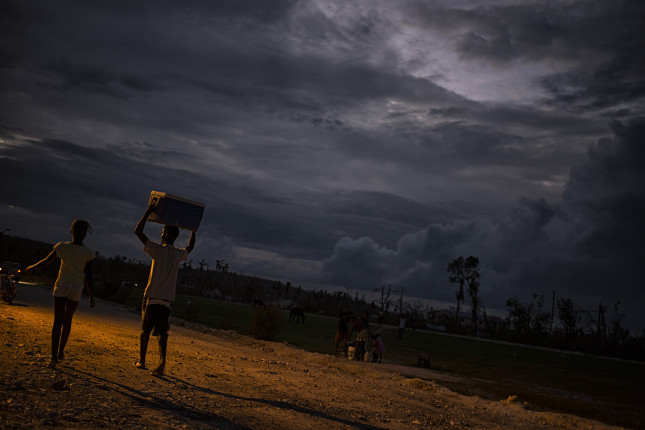
Sources: Dady Chery is the author of We Have Dared to Be Free: Haiti’s Struggle Against Occupation | Photographs one to three from Le Nouvelliste via Radio TV Caraibes; ten to thirteen from @gaetantguevara.

